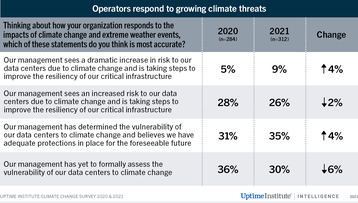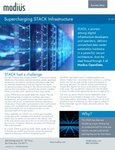In the 2020 Uptime Institute Intelligence report The gathering storm: Climate change and data center resiliency, the author noted that, “While sustainability… features heavily in the marketing of many operators, the threat of extreme weather to continued operations has received far less attention… some complacency may have set in.”
Floods, fires, and freezes
Events of 2021 have changed that. Fires, floods, big freezes and heat waves — coupled with investor activism and threatened legislation mandating greater resiliency to climate change impacts — have driven up awareness of the risks to critical infrastructure. More data center operators are now carrying out both internal and external assessments of their facilities’ vulnerability to climate change-related events and long-term changes. A growing proportion is now reacting to what they perceive to be a dramatic increase in risk.
To track changing attitudes and responses to climate change and the related threats to infrastructure, Uptime Institute Intelligence concluded two global surveys in the fourth quarters of 2020 and 2021, respectively. The latest survey was conducted before the 2021 COP26 (Conference of the Parties) meeting in Glasgow, Scotland, which, according to some surveys, raised further awareness of the seriousness of climate change in some countries.
In our 2021 survey, 70 percent of respondents said they or their managers have conducted climate change risks assessments of their data centers. This number is up from 64 percent a year earlier (see Table 1). In around half of these cases, managers are taking, or plan to take, steps to upgrade the resiliency of their critical infrastructure.
The figures are not wholly reassuring. First, one in 10 data center operators now sees a dramatic increase in the risk to their facilities — a figure that suggests many hundreds of billions of dollars of data center assets are currently believed to be at risk by those who are managing them. Insurers, investors and customers are taking note.
Second, one in three owners/operators still has not formally conducted a risk assessment related to weather and/or climate change. Of course, data center operators and owners are risk averse, and most facilities are sited and built in a very cautious way. Even so, no regions or sites are beyond the full effects of climate change, especially as many supply chains are vulnerable. Both the data and the legislative activity suggest that more formal and regular assessments will be needed.
The surveys further revealed that about one in three organizations uses external experts to assess their critical infrastructure climate change risks, up from about a quarter a year ago. This is likely to increase as regulators and investors seek to quantify, validate and reduce risks. The Task Force for Climate Financial Disclosures (TCFS), a nongovernmental organization influencing investor and government policy in many countries, advises organizations to adopt and disclose processes and standards for identifying climate change risks to all corporate assets.






